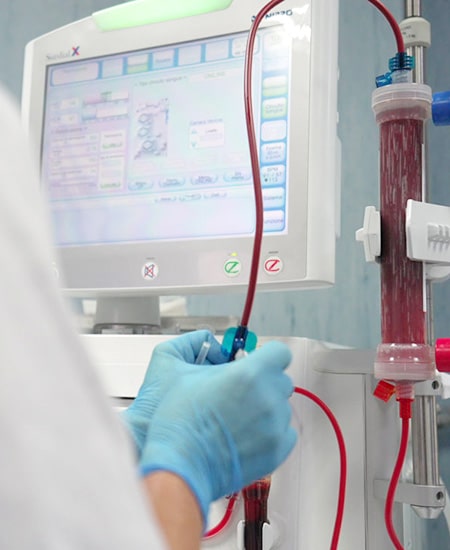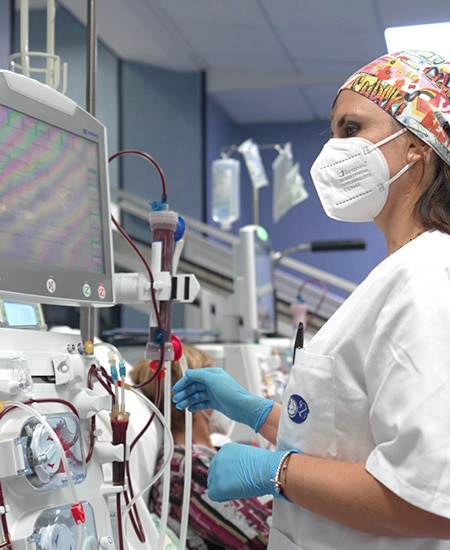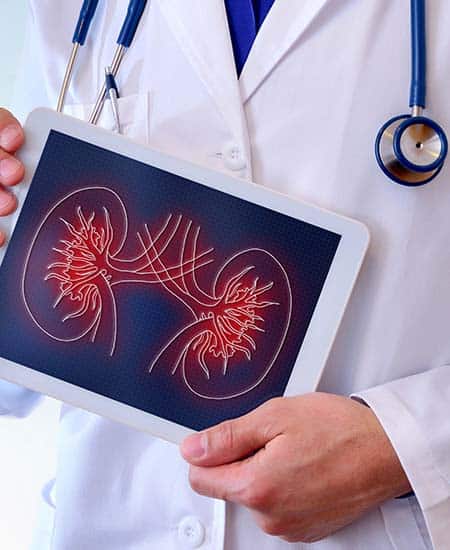What is Dialysis?
Dialysis is a therapy designed to remove waste products from the body that the kidneys can no longer filter. It becomes necessary in the advanced stages of chronic kidney disease when kidney function drops below 10-15%. Dialysis helps balance the levels of potassium, sodium, calcium, phosphorus, and bicarbonate in the blood. Introduced in the 1940s and widely adopted in the 1960s, dialysis remains the most effective method for blood purification today.
When is Dialysis Needed?
The kidneys are responsible for filtering the blood, removing harmful waste products, and excess fluids, which are then expelled as urine. When chronic kidney failure prevents the blood from being properly cleaned, toxins accumulate, causing discomfort and, in severe cases, can lead to death. Dialysis replaces the kidney’s function by filtering out unwanted substances and fluids, while also helping to regulate blood pressure. A nephrologist regularly monitors kidney function with blood tests to measure levels of creatinine, sodium, potassium, calcium, phosphorus, and uric acid, or by evaluating the glomerular filtration rate.

Duration of Dialysis Treatment
Dialysis may be temporary or permanent, depending on the underlying cause of kidney failure. If kidney function is restored, dialysis may no longer be necessary. However, if dialysis is permanent, a kidney transplant is the only solution to fully restore kidney function, including hormone release. Until a compatible donor is found, dialysis treatment continues. In cases where a transplant is not possible due to age or overall health, the patient may require lifelong dialysis.
Types of Dialysis
There are two main types of dialysis: hemodialysis (extracorporeal) and peritoneal dialysis (intracorporeal). The distinction is based on where the filtration process occurs — either outside or inside the body using an artificial kidney machine. Hemodialysis involves circulating blood through an external circuit, where waste products and excess fluids are transferred to the dialysis fluid. In Italy, hemodialysis is the most common treatment for patients with chronic kidney failure.
Arteriovenous Fistula
During hemodialysis, a patient is connected to an artificial kidney machine through a needle and cannula inserted into the arm. This access point is created by an arteriovenous fistula, which connects a vein and an artery. The fistula is ready for use about six weeks after it is surgically created.
How Hemodialysis Works
The machine draws blood through a pump, pushing it into a filter where it is cleaned and then returned to the body. Fluid removal is achieved by the pressure generated by the pump, supplemented by the dialysis machine when necessary. This process typically lasts around four hours and is conducted three times a week for optimal benefits.


Risks of Hemodialysis
There are some risks associated with hemodialysis, such as an increased risk of bleeding immediately after treatment due to heparin, which prevents blood clotting during filtration. Other risks include infection or thrombus formation at the vascular access site, requiring constant monitoring by a nephrologist. Inadequate potassium removal may also lead to cardiac arrhythmias.
Central Venous Catheter (CVC) Use
A central venous catheter is used when the kidneys suddenly stop working, and urgent dialysis is needed. Typically inserted into the neck or leg, the CVC serves as an emergency solution when a fistula cannot be created.
Living with Dialysis
One of the main concerns for patients starting dialysis is how it will impact their daily lives. At NefroCenter, our highly specialized medical staff provides all the answers and support needed to adapt. Patients on dialysis can continue to work, study, travel, exercise, and drive.
Side Effects of Dialysis
Dialysis can cause side effects such as low blood pressure, fatigue, tingling, itching, and muscle cramps. Patients with a catheter should avoid swimming in the sea to reduce the risk of infection. Advances in dialysis technology have greatly improved life expectancy for patients, although this also depends on other concurrent conditions. Some patients have been on hemodialysis for over 30 years, though the body can still be affected.


Foods to Avoid
Dialysis patients should avoid foods that are harmful, such as alcoholic beverages, broths, salted foods like capers or pickled fish, and all types of cured meats. Sauces like margarine, mayonnaise, mustard, ketchup, barbecue sauce, and salty snacks should also be eliminated. It is also advisable to avoid fast food and junk food.
Recommended Drinks for Dialysis Patients
Managing fluid intake is crucial for dialysis patients. They should drink cool, not cold, unsweetened beverages to stay refreshed without consuming too much liquid. Sucking on ice cubes made from lemon juice (without sugar) is also recommended.
NefroCenter Dialysis Centers
We provide top-quality healthcare services; find the nearest center to you.
NefroCenter specializes in dialysis, nephrology, diabetology, imaging diagnostics, clinical laboratory analysis, cardiology, rehabilitation, hyperbaric chambers, neurodiagnostic, and more.
Dialysis During Vacation
Enjoy your holidays worry-free with NefroCenter.
Nefrocenter is also a European leader in vacation dialysis programs at its seven centers located in tourist destinations: Ischia, Procida, Castelvolturno, Cava de Tirreni (Amalfi Coast), Formia, Jesolo, and Bibione.
GSE srl - Ischia
- Via Michele Mazzella 70 - Ischia
- t. 081 333 6111
- Lunedì - Sabato | 8.30 - 18.30
Procida Dialisi
- Via SS. Annunziata 3 - Procida
- t. 081 1936 9565
- Lunedì - Domenica | 9.00 - 21.00
Ludial
- Domitiana km 30.8 - Castelvolturno
- t. 0823762037
- Lunedì - Venerdì | 8:00 - 18:30
Dialisi Saturnia
- Via G. Leopardi 4 - Spigno Saturnia LT
- t. 0771 64420
- Giorni dispari | 6.30 - 18.30
Betadial
- Via XXV Luglio 160 - Cava de Tirreni
- t. 089 343712
- Tutti i giorni 7–11 | 13-17 | 19-23
